The Legislative Yuan is to vote on President Tsai Ing-wen’s (蔡英文) nominations for the Control Yuan on July 17 after Democratic Progressive Party (DPP) legislators regained access to the legislative chamber yesterday after it was occupied by Chinese Nationalist Party (KMT) lawmakers for about 19 hours.
The Legislative Yuan had been scheduled to meet yesterday morning to discuss its planned extraordinary session, but more than 20 KMT lawmakers on Sunday afternoon broke into the main chamber and occupied the legislative speaker’s podium to protest Tsai’s nomination of former Presidential Office secretary-general Chen Chu (陳菊) to be Control Yuan president.
The KMT caucus asked whether Chen was qualified, given that during her tenure as Kaohsiung mayor from 2006 to 2018, the Control Yuan launched 58 investigations into her team, including 30 cases of corrective measures and three impeachments.
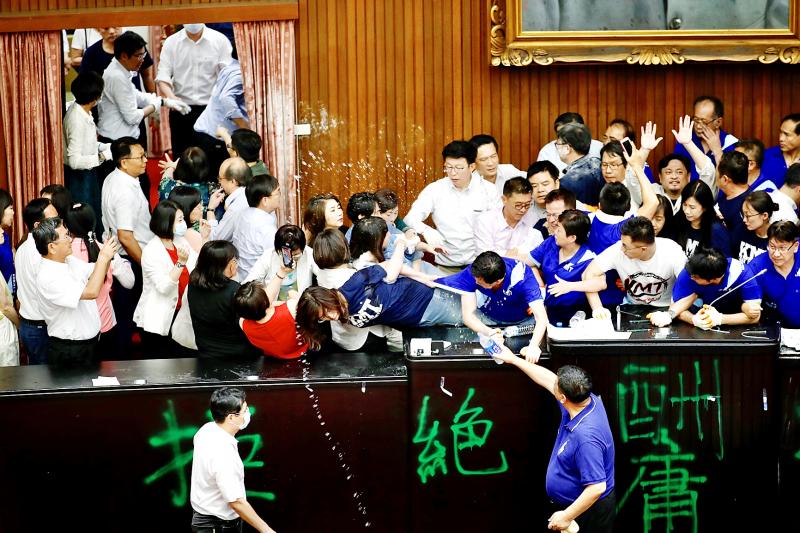
Photo: Ritchie B. Tongo, EPA-EFE
The KMT lawmakers blocked entry to the main chamber with chairs and chains, but their occupation ended at about 11:15am when DPP legislators broke the chains with bolt cutters.
DPP and KMT legislators scuffled for about an hour before the KMT lawmakers retreated.
Legislative Speaker You Si-kun (游錫堃) entered the chamber at about 12:20pm, while KMT legislators shouted chants calling for the withdrawal of Chen’s nomination.
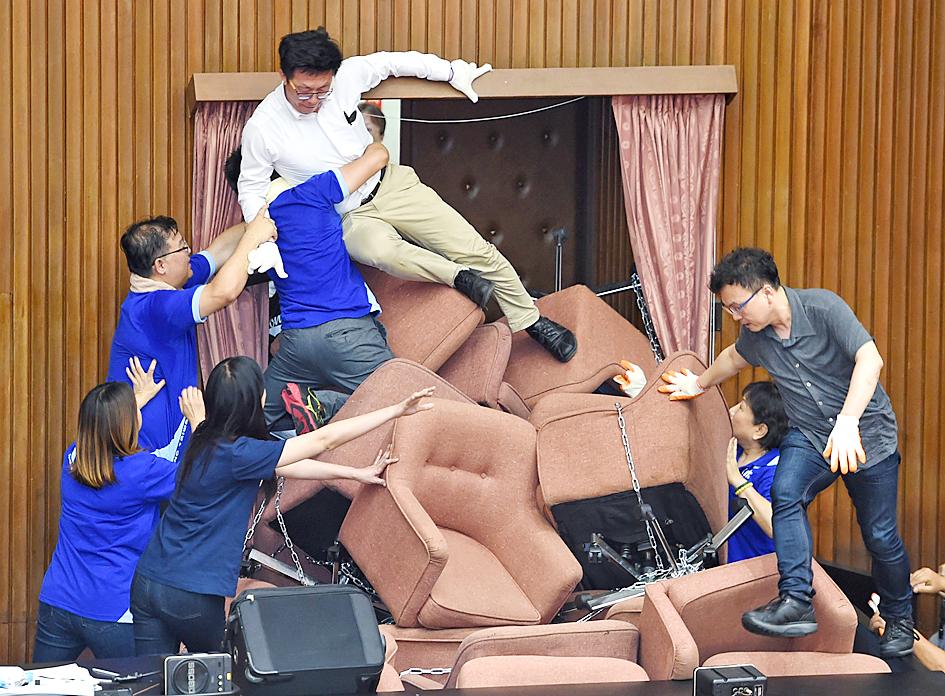
Photo: Liu Hsin-de, Taipei Times
The DPP caucus proposal to hold an extraordinary session from yesterday to July 22 passed 46-28.
The DPP caucus’ proposals to vote on the Examination Yuan and Control Yuan nominations, on Friday next week and July 17 respectively, also passed.
DPP caucus whip Ker Chien-ming (柯建銘) said that it is impossible for the caucus to accept KMT lawmakers’ demand that Chen’s nomination be dropped, and he accused the KMT of resorting to an “attack approach” with baseless accusations against Chen.
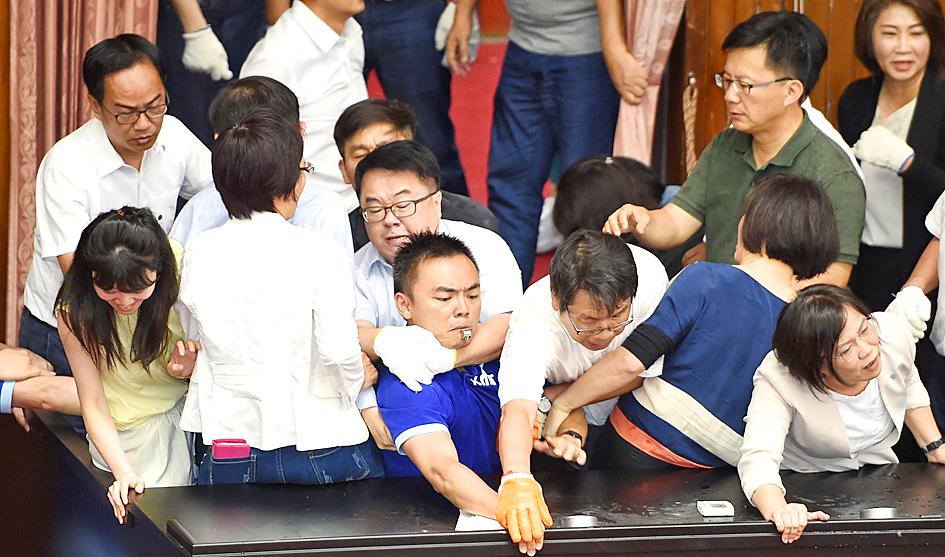
Photo: Liu Hsin-de, Taipei Times
Speaking to reporters outside the legislative chamber at about 1pm, KMT Legislator Hung Mong-kai (洪孟楷) accused DPP lawmakers of seizing him by the neck during a scuffle inside.
Hung asked if Tsai, who doubles as DPP chairperson, approved of what he described as “homicidal violent behavior” by DPP lawmakers and called on her to apologize.
KMT Legislator Chiang Wan-an (蔣萬安) condemned DPP lawmakers’ actions against Hung on behalf of the KMT caucus, adding that Sunday’s occupation was “just the beginning,” and KMT lawmakers would continue to “stand on the side of the people” and “defend democracy [and] justice.”
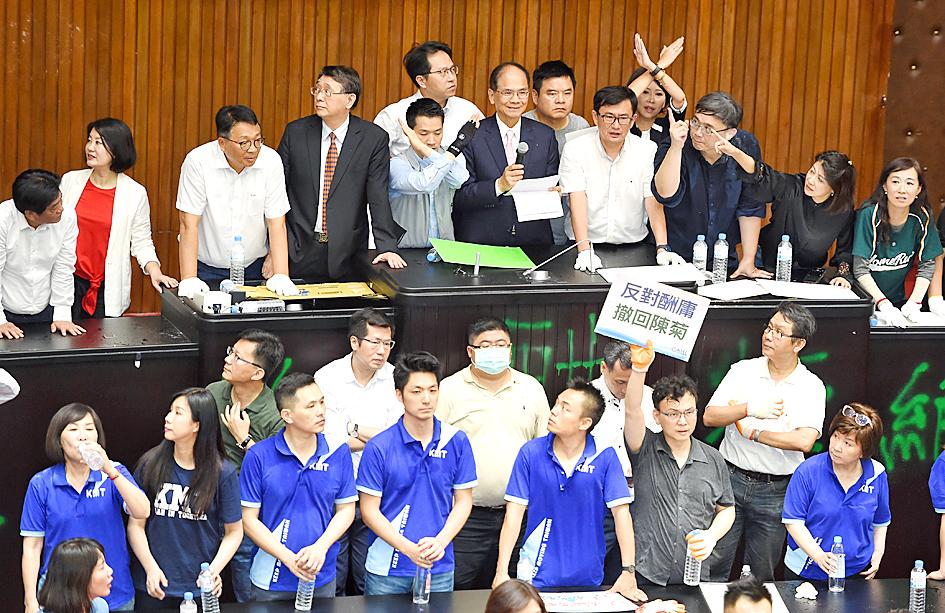
Photo: Liu Hsin-de, Taipei Times
Speaking to supporters from a raised platform on a truck parked outside the Legislative Yuan, KMT Chairman Johnny Chiang (江啟臣) said that KMT lawmakers are prepared to return to the legislative chamber “anytime.”
The sides of the truck were covered with posters printed with the words, “Democracy is dead” and “Tyranny must die.”
At about 3:30pm, KMT lawmakers attempted to take over the podium inside the legislative chamber, but were blocked by DPP legislators.
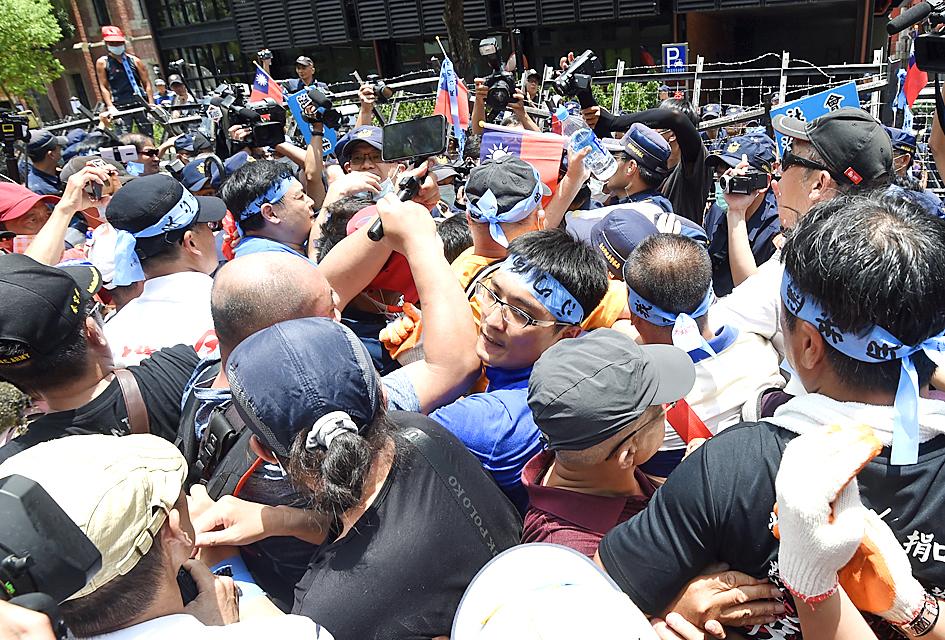
Photo: Chien Jung-fong, Taipei Times
DPP Legislator Chung Chia-pin (鍾佳濱) said that to ensure that the extraordinary session runs smoothly, DPP lawmakers would take turns standing guard outside the legislative chamber.
Additional reporting by CNA, Lin Liang-sheng and Hsieh Chun-lin

CHAOS: Iranians took to the streets playing celebratory music after reports of Khamenei’s death on Saturday, while mourners also gathered in Tehran yesterday Iranian Supreme Leader Ayatollah Ali Khamenei was killed in a major attack on Iran launched by Israel and the US, throwing the future of the Islamic republic into doubt and raising the risk of regional instability. Iranian state television and the state-run IRNA news agency announced the 86-year-old’s death early yesterday. US President Donald Trump said it gave Iranians their “greatest chance” to “take back” their country. The announcements came after a joint US and Israeli aerial bombardment that targeted Iranian military and governmental sites. Trump said the “heavy and pinpoint bombing” would continue through the week or as long

TRUST: The KMT said it respected the US’ timing and considerations, and hoped it would continue to honor its commitments to helping Taiwan bolster its defenses and deterrence US President Donald Trump is delaying a multibillion-dollar arms sale to Taiwan to ensure his visit to Beijing is successful, a New York Times report said. The weapons sales package has stalled in the US Department of State, the report said, citing US officials it did not identify. The White House has told agencies not to push forward ahead of Trump’s meeting with Chinese President Xi Jinping (習近平), it said. The two last month held a phone call to discuss trade and geopolitical flashpoints ahead of the summit. Xi raised the Taiwan issue and urged the US to handle arms sales to

State-run CPC Corp, Taiwan (CPC, 台灣中油) yesterday said that it had confirmed on Saturday night with its liquefied natural gas (LNG) and crude oil suppliers that shipments are proceeding as scheduled and that domestic supplies remain unaffected. The CPC yesterday announced the gasoline and diesel prices will rise by NT$0.2 and NT$0.4 per liter, respectively, starting Monday, citing Middle East tensions and blizzards in the eastern United States. CPC also iterated it has been reducing the proportion of crude oil imports from the Middle East and diversifying its supply sources in the past few years in response to geopolitical risks, expanding

Pro-democracy media tycoon Jimmy Lai’s (黎智英) fraud conviction and prison sentence were yesterday overturned by a Hong Kong court, in a surprise legal decision that comes soon after Lai was jailed for 20 years on a separate national security charge. Judges Jeremy Poon (潘兆初), Anthea Pang (彭寶琴) and Derek Pang (彭偉昌) said in the judgement that they allowed the appeal from Lai, and another defendant in the case, to proceed, as a lower court judge had “erred.” “The Court of Appeal gave them leave to appeal against their conviction, allowed their appeals, quashed the convictions and set aside the sentences,” the judges